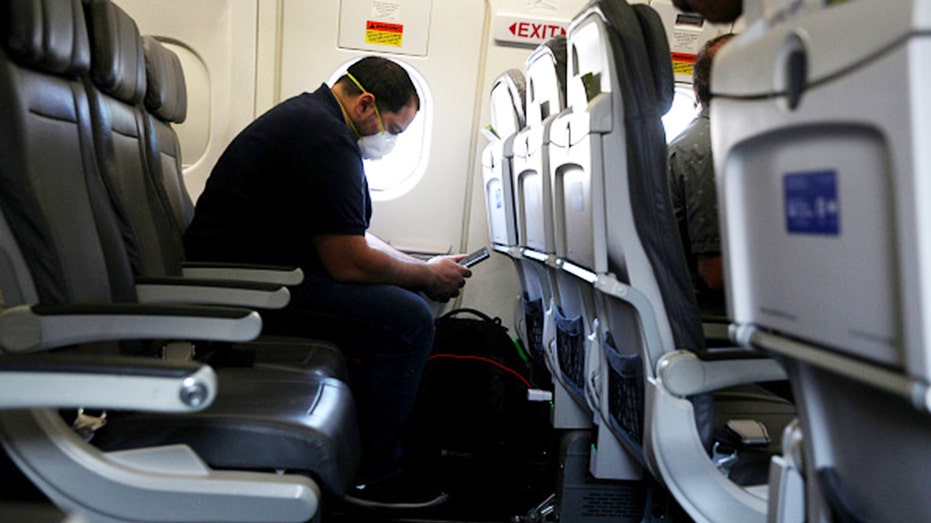Amid airline industry slump, new study shows flying may actually be safer than grocery shopping, indoor dining
Air filters remove over 99% of the particles containing the virus from the cabin air, researchers say
Although droves of travelers have been avoiding airports since the onset of the pandemic, new research suggests that flying may actually be safer than grocery shopping or dining out.
Aviation Public Health Initiative researchers at the Harvard T.H. Chan School of Public Health suggested in a new report that there is a low risk of transmission of COVID-19 aircraft due to the frequent exchange of air and HEPA (high-efficiency particulate air) filters.
HERE ARE SOME TOP CORONAVIRUS RISKS WHEN FLYING
Such filters remove over 99% of the particles containing the virus from the cabin air. At the same time, these filters are "rapidly dispersing exhaled air with displacement in the downward direction," according to the study that was posted Tuesday.
Researchers say that the "ventilation of air on aircraft reduces the possibility of exposure to COVID-19, lower than other common settings such as a grocery store or indoor restaurant."
However, these ventilators aren't alone in keeping passengers safe, according to the study.
Researchers pointed to face mask mandates, social distancing protocols, the disinfection of high-touch surfaces and the provision of strong ventilation as well as only allowing passengers who assured that they are not infected board as contributing factors in keeping the transmission risk low.
But, the report may be a sign of relief for the airline industry, which continues to face devastating losses as the pandemic chokes off air travel and leaves once highly profitable airlines to forage for billions of dollars in government aid and private borrowing until demand returns. Some airlines have already furloughed thousands of employees because of the pandemic.
Earlier this month, United executives described the pandemic as the "worst crisis in the history of aviation," according to The Wall Street Journal.
And although the number of flyers is starting to rebound from historically low levels seen earlier this year, executives at the major carriers predict it will be years before passenger demand returns to pre-coronavirus levels.
"It may be two years or more until we see a normalized revenue environment," Delta Air Lines President Glen Hauenstein said in an earnings release.
And getting to that point will be no easy task, Delta CEO Ed Bastian told Maria Bartiromo during an interview on "Mornings with Maria" last week.
"It’s not as if there’s going to be a green light that goes off and we’re all back traveling internationally," he said. "We’re going to have to put some pilots in place, some experimental routes, using testing."
To do so, he said, "testing will be the key to opening up international flows, without a quarantine requirement."
Bastin also explained the importance of business travel to the airline.
"Business revenues should represent close to half of our overall business. Right now it’s significantly lower than that," Bastian said. "Business travel has always come back faster than anything we expect. It goes down harder as businesses cut it first, and it comes back faster than anyone is expecting. I don’t know that it will get back to 100%, but I do think we’ll get back to a meaningful level."
However, officials at many airlines believe travel won’t fully return until the pandemic is under control and a vaccine is widely available.

A passenger looks at his phone while waiting aboard a United Airlines plane before taking off from George Bush Intercontinental Airport on May 11, 2020 in Houston, Texas. (Photo by Justin Sullivan/Getty Images)
Meanwhile, Leonard Marcus, co-director of Aviation Public Health Initiative (APHI), said there is still hope for the airline industry even before a vaccine hits the market.
CORONAVIRUS PANDEMIC RESHAPING AIR TRAVEL AS CARRIERS STRUGGLE
“With comprehensive adherence to these preventive measures by airlines and passengers, air travel, along with other sectors of society, can responsibly return to some level of normal activity as we await the development of an effective vaccine," Marcus said.
That said, researchers recommend that airlines continue to make sure "appropriate ventilation is maintained throughout the boarding and deplaning" process and that stick protocols continue to be followed, particularly social distancing and facemask mandates.
GET FOX BUSINESS ON THE GO BY CLICKING HERE
Even still, "any individual’s decision to engage in any public activity, including flying, must be balanced by personal health considerations," Marcus cautioned.
Researchers plan to conduct a second phase of the study which will test and examine the indoor air environment of airports, and other measures to reduce the risk of disease transmission.
FOX Business' Lucas Manfredi, Evie Fordham and The Associated Press contributed to this report.




















